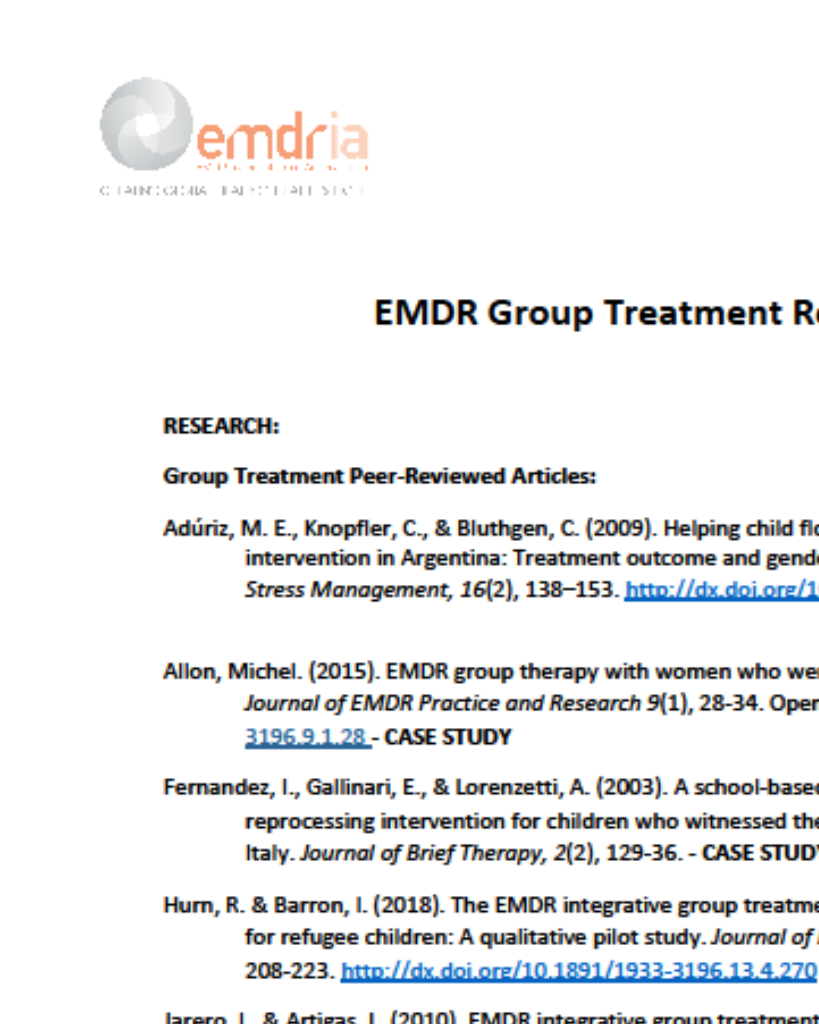Short- and long-term effectiveness of brief intensive trauma treatment for adolescents with posttraumatic stress disorder and their caregivers: Protocol for a multicenter randomized controlled trial
This study tests the effectiveness of a 1 week brief intensive trauma treatment (BITT) that includes EMDR therapy for adolescents with PTSD and their caregivers.
Article Abstract
“Background: Childhood trauma is pervasive, with approximately 50% of adolescents experiencing at least one potentially traumatic event before adulthood. Eight percent to 33% of potentially traumatic event–exposed adolescents develop posttraumatic stress disorder (PTSD), which can cause extreme suffering and coincides with numerous comorbid illnesses and high-risk behaviors. PTSD can be effectively treated in adolescents through weekly sessions of eye movement desensitization and reprocessing or trauma-focused cognitive behavioral therapy. Despite the availability of these treatments, numerous severely traumatized adolescents do not receive available treatment options due to high treatment avoidance. In adolescents who receive care, a large group of youth does not experience a sufficient symptom decrease after regular treatment. In addition, dropout rates during prolonged treatment are substantial, varying between 10% and 30%. This underscores the need for innovative and brief trauma treatment. Pilot studies indicate that Brief Intensive Trauma Treatment (BITT) can be a safe and effective treatment for adolescents with PTSD. However, randomized controlled trials on its effectiveness are crucial and urgently needed.
Objective: This is the first study to test the effectiveness of a 1-week BITT in adolescents with PTSD and comorbid symptoms and their caregivers.
Methods: This multicenter, single-blinded randomized controlled trial will be conducted in 4 youth care centers in the European and Caribbean Netherlands: Levvel, Karakter, Fornhese-GGz Centraal, and Mental Health Caribbean (Bonaire). We will randomize adolescents (12-18 years old) with PTSD to a BITT (n=50) or waitlist control group (WLCG; n=50). BITT comprises 1-week (ie, 5 consecutive workdays) intensive trauma treatment, encompassing daily 90-minute manualized sessions of trauma-focused cognitive behavioral therapy and eye movement desensitization and reprocessing. The day begins and ends with psychomotor therapy. Caregivers receive daily parental counseling sessions consisting of psychoeducation and social support skill training. We will conduct measurements at similar intervals for both groups: at baseline; directly after BITT or WLCG; and at 3, 6, and 9 months’ follow-up. The WLCG will receive BITT after the 3-month follow-up assessment. We will assess all study parameters using digital or face-to-face questionnaires and semistructured interviews. We will assess the primary outcome PTSD symptoms using the Child and Adolescent Trauma Screen 2 (CATS-2) and the Clinician-Administered PTSD Scale for DSM-5 (Diagnostic and Statistical Manual of Mental Disorders [Fifth Edition])-Child/Adolescent Version (CAPS-CA-5).
Results: As of September 2022, we enrolled 104 participants. Data will be collected until December 2025. Results are expected to be published in the summer of 2026.
Conclusions: This first, innovative study on BITT’s effectiveness may enhance treatment outcomes for PTSD by preventing dropout, reducing avoidance, shortening therapy duration, and empowering therapists by working together intensively. This research will provide valuable insights across cultures for treating severely traumatized adolescents who do not benefit sufficiently from regular treatment.
Trial Registration: ClinicalTrials.gov NCT06143982, http://clinicaltrials.gov/ct2/show/NCT06143982. International Registered Report Identifier (IRRID):DERR1-10.2196/66115″
—Description from publisher
Article Access
Open Access
Westerveld, M. M., van der Mheen, M., Knipschild, R., Maijer, K., de Keizer-Altink, M. E., Albisser, N., Hoekstra, M. J. E., Timmermans-Jansen, A., Zijp, R., Krabbendam, A. A., van Steensel, F. J. A., Kan, K. J., Huyser, C., Staal, W. G., Utens, E. M. W. J., & Lindauer, R. J. L. (2025). Short- and long-term effectiveness of brief intensive trauma treatment for adolescents with posttraumatic stress disorder and their caregivers: Protocol for a multicenter randomized controlled trial. JMIR Research Protocols, 14: e66115. Open access: https://doi.org/10.2196/66115
Date
April 30, 2025
Creator(s)
Myrna M Westerveld, Malindi van der Mheen, Rik Knipschild
Contributor(s)
Kim Maijer, Marieke E de Keizer-Altink, Nina Albisser, Marielle J E Hoekstra, Anne Timmermans-Jansen, Rosa Zijp, Anne A Krabbendam, Francisca J A (Bonny) van Steensel, Kees-Jan Kan, Chaim Huyser, Wouter G Staal, Elisabeth M W J Utens, Ramón J L Lindauer
Topics
PTSD
Client Population
Adolescents, Families/Parents
Practice & Methods
Integrative Therapies, Intensives, Protocols
Extent
14 pages
Publisher
JMIR Publications
Rights
©Myrna M Westerveld, Malindi van der Mheen, Rik Knipschild, Kim Maijer, Marieke E de Keizer-Altink, Nina Albisser, Marielle J E Hoekstra, Anne Timmermans-Jansen, Rosa Zijp, Anne A Krabbendam, Francisca J A (Bonny) van Steensel, Kees-Jan Kan, Chaim Huyser, Wouter G Staal, Elisabeth M W J Utens, Ramón J L Lindauer. Originally published in JMIR Research Protocols (https://www.researchprotocols.org), 30.04.2025.
APA Citation
Westerveld, M. M., van der Mheen, M., Knipschild, R., Maijer, K., de Keizer-Altink, M. E., Albisser, N., Hoekstra, M. J. E., Timmermans-Jansen, A., Zijp, R., Krabbendam, A. A., van Steensel, F. J. A., Kan, K. J., Huyser, C., Staal, W. G., Utens, E. M. W. J., & Lindauer, R. J. L. (2025). Short- and long-term effectiveness of brief intensive trauma treatment for adolescents with posttraumatic stress disorder and their caregivers: Protocol for a multicenter randomized controlled trial. JMIR Research Protocols, 14: e66115. Open access: https://doi.org/10.2196/66115
Audience
EMDR Therapists
Language
English
Content Type
Article, Peer-Reviewed, RCT
Access Type
External Resource, Open Access





